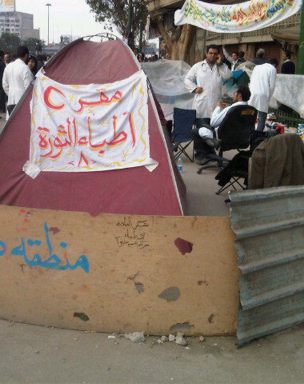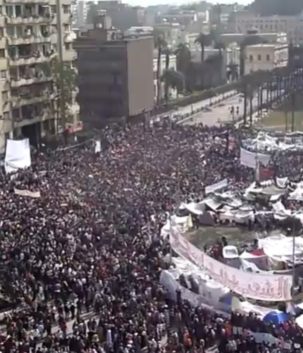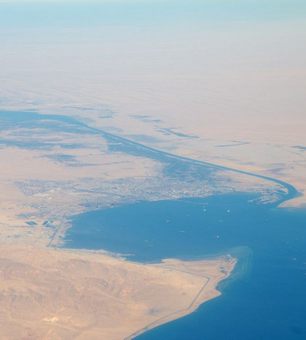|
Egypt Labour | Economy - Development | Politics Wave of strikes could bring Mubarak down
An estimated six thousand workers operating the Suez Canal started strikes and sit-down actions yesterday, in support of the nation-wide protest movement demanding President Hosni Mubarak to step down.
Today, they are joined by thousands of nurses and hospital workers, lawyers, veterinarians, cinema industry workers, postal workers and industry workers. Marches from different parts of Cairo are directed towards Tahrir Square, many passing by parliament or their relevant ministry to chant anti-government slogans. Outside Cairo, the strikes have also reached the city of El-Mahalla El-Kubra of half a million inhabitants, located 130 kilometres north of Cairo in the industrial heartland of Egypt. Largely ignored by international media - and totally ignored by Egyptian media - large crowds of protesters have filled the streets of El-Mahalla for more than one week. Now, also the workers of El-Mahalla's key Misr Spinning and Weaving Company, employing 27,000, have laid down their work in a political strike. The protests therefore now have reached Egypt's key and vast industrial sector, employing around 17 percent of the national workforce, or between 4 and 5 million people. Major strikes outside Cairo include cities that so far had been little affected by the protests, with Luxor, Menya and Quesna being among the most active. Here, major companies in the textiles, cement, coal and pharmaceutical industries are experiencing major labour protests and strikes. The extending strikes are going far in paralysing the Egyptian economy. Egypt's main industry is the textile sector, which now is joini
Agriculture, representing around 30 percent of the Egyptian economy, is the least affected sector so far, although erratic financial services, transport strikes and interruptions and unpredictable markets are having their effect. Yesterday, the first major protests in rural areas of Egypt were noted, and brutally suppressed by police forces. Also in the service sector, representing more than half of Egypt's economy, strikes and protests are rife. Strikes are directly affecting the transport and education sector. Also groups of state employees and parts of the cultural sector and the communications sector have announced strikes. Egypt's large banking and finance sector has been strongly affected of the unrest. The government however still can count on key revenues from external aid - mainly the US - and from the Suez Canal. Revenues from the Canal have already dropped since the unrest, but could cease totally if the strikes succeed in closing operations. With a smelt-down of the Egyptian economy, pressure from within the regime and from foreign governments for President Mubarak to step down would strongly increase. Internationally, the Egypt unrests have already led to a record oil price, and the closure of the Suez Canal would have great implications on world trade. By staff writers © afrol News - Create an e-mail alert for Egypt news - Create an e-mail alert for Labour news - Create an e-mail alert for Economy - Development news - Create an e-mail alert for Politics news
On the Afrol News front page now
|
front page
| news
| countries
| archive
| currencies
| news alerts login
| about afrol News
| contact
| advertise
| español
©
afrol News.
Reproducing or buying afrol News' articles.
You can contact us at mail@afrol.com










